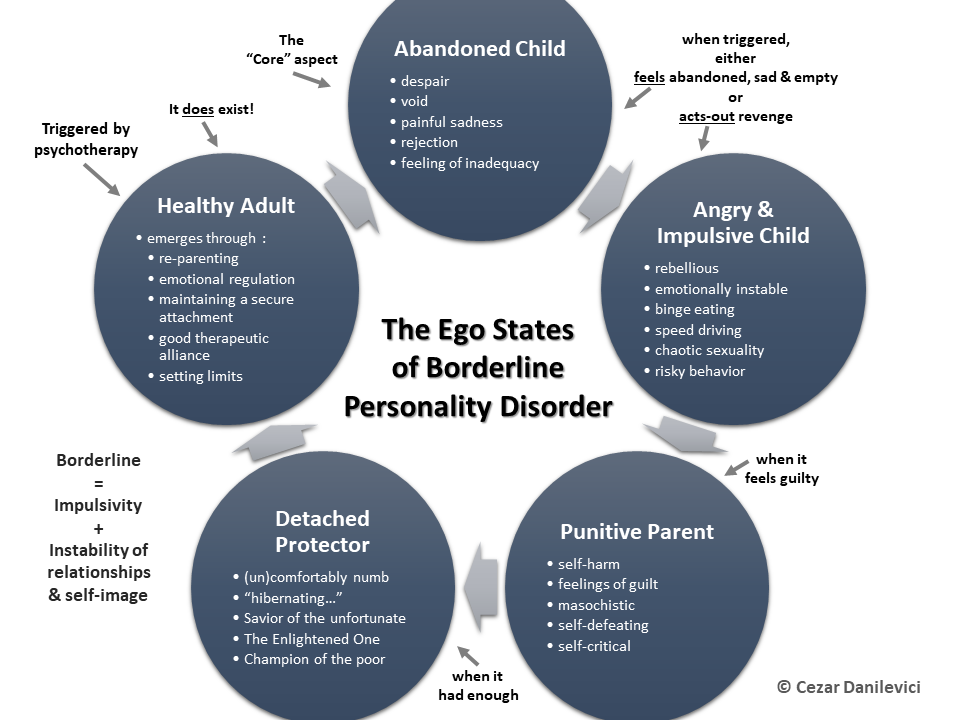Schema Therapy • Jeffrey Young
There are 5 Schema Domains and a total of 18 Maladaptive Schemas, with 3 maladaptive coping styles (or responses) for each maladaptive schema:
• Surrender (Compliance, Dependence)
• Avoidance (Social withdrawal, Excessive autonomy, Compulsive Stimulation-seeking, Addictive Self-Soothing, Psychological Withdrawal)
• Overcompensation or Counterattack (Aggression, Hostility, Dominance, Excessive Self-assertion, Recognition-seeking, Status-seeking, Manipulation, Exploitation, Passive-aggressiveness, Rebellion, Excessive Orderliness).
1. DISCONNECTION & REJECTION
Abandonment & Instability
S – Selects partners who cannot make a commitment and remains in the relationships
A – Avoids intimate relationships; drinks a lot when alone
O – Clings to and “smothers” the partner to point of pushing partner away; vehemently attacks partner for even minor separations
Mistrust & Abuse
S – Selects abusive partners and permits abuse
A – Avoids becoming vulnerable and trusting anyone; keeps secrets
O – Uses and abuses others (“get others before they get you”)
Emotional Deprivation (lack of nurturance, empathy, protection)
S – Selects emotionally depriving partners and does not ask them to meet needs
A – Avoids intimate relationships altogether
O – Acts emotionally demanding with partners and close friends
Defectiveness & Shame
S – Selects critical and rejecting friends; puts self down
A – Avoids expressing true thoughts and feelings and letting others get close
O – Criticizes and rejects others while seeming to be perfect
Social Isolation/Alienation & Exclusion
S – At social gatherings, focuses exclusively on differences from others rather than similarities
A – Avoids social situations and groups
O – Becomes a chameleon to fit into groups
2. IMPAIRED AUTONOMY & PERFORMANCE
Dependence & Incompetence
S – Asks significant others (parents, spouse) to make all his or her financial decisions
A – Avoids taking on new challenges, such as learning to drive
O – Becomes so self-reliant that he or she does not ask anyone for anything (“counter-dependent”)
Vulnerability (to Harm or Illness)
S – Obsessively reads about catastrophes in newspapers and anticipates them in everyday situations
A – Avoids going places that do not seem totally “safe”
O – Acts recklessly, without regard to danger (“counter-phobic”)
Enmeshment & Undeveloped Self
S – Tells mother everything, even as an adult; lives through partner
A – Avoids intimacy; stays independent
O – Tries to become the opposite of significant others in all ways
Failure
S – Does tasks in a halfhearted or haphazard manner
A – Avoids work challenges completely; procrastinates on tasks
O – Becomes an “overachiever” by ceaselessly driving him- or herself
3. IMPAIRED LIMITS
Entitlement & Grandiosity
S – Bullies others into getting own way, brags about own accomplishments
A – Avoids situations in which he or she is average, not superior
O – Attends excessively to the needs of others
Insufficient Self-Control & Self-Discipline
S – Gives up easily on routine tasks
A – Avoids employment or accepting responsibility
O – Becomes overly self-controlled or self-disciplined
4. OTHER-DIRECTEDNESS
Subjugation
S – Lets other individuals control situations and make choices
A – Avoids situations that might involve conflict with another individual
O – Rebels against authority
Self-Sacrifice
S – Gives a lot to others and asks for nothing in return
A – Avoids situations involving giving or taking
O – Gives as little to others as possible
Approval-Seeking & Recognition-Seeking
S – Acts to impress others
A – Avoids interacting with those whose approval is coveted
O – Goes out of the way to provoke the disapproval of others; stays in the background
5. OVERVIGILANCE & INHIBITION
Negativity & Pessimism
S – Focuses on the negative; ignores the positive; worries constantly; goes to great lengths to avoid any possible negative outcome
A – Drinks to blot out pessimistic feelings and unhappiness
O – Is overly optimistic (“Pollyanna”-ish); denies unpleasant realities
Emotional Inhibition
S – Maintains a calm, emotionally flat demeanor
A – Avoids situations in which people discuss or express feelings
O – Awkwardly tries to be the “life of the party”, even though it feels forced and unnatural
Unrelenting Standards & Hyper-criticalness
S – Spends inordinate amounts of time trying to be perfect
A – Avoids or procrastinates in situations and tasks in which performance will be judged
O – Does not care about standards at all – does tasks in a hasty, careless manner
Punitiveness
S – Treats self and others in harsh, punitive manner
A – Avoids others for fear of punishment
O – Behaves in overly forgiving way.


